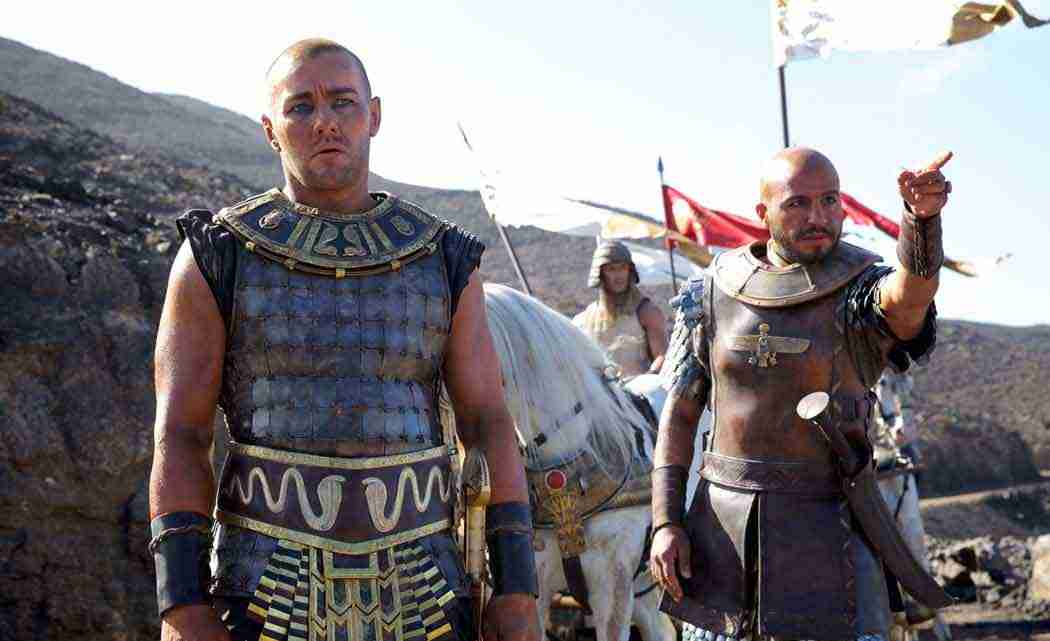By SANDY COHEN
LOS ANGELES — Put “ancient Egyptian people” into a Google image search, and none of the resulting photos resemble Christian Bale or Joel Edgerton, stars of Ridley Scott’s biblical epic Exodus: Gods and Kings.
The director-inflamed calls for a boycott of the film with his comments last week that he couldn’t have made such a big-budget movie if “my lead actor is Mohammad so-and-so from such-and-such.”
“I’m just not going to get it financed,” he told the trade paper Variety. “So the question doesn’t even come up.”
The question, perhaps, being: Should Hollywood be concerned about casting white actors to portray
people who were definitely not white?
It’s an institutional problem, said professor Todd Boyd, chair for the Study of Race and Popular Culture at the University of Southern California. Hollywood is a place where profit is king, he said, and it rarely takes big-budget risks on casts of color.
“The way movies get financed, and the overall ignorance in this country about Africa, explains why you’d have a big budget film with a very well-known director backed by a well-known studio mogul and get this problematic representation in 2014,” he said.
The financial argument doesn’t hold up. What might make a movie successful is speculative, and those with diverse casts are just as likely to become global box-office hits. Consider the Hunger Games and Fast & Furious franchises. The latter has made more than $2 billion worldwide.
Exodus stars Bale as Moses, Edgerton as pharaoh-to-be Ramses, John Turturro as the Egyptian leader and Sigourney Weaver as his queen. Actors of color occupy minor, mostly non-speaking roles.
There’s a long history of such casting in Hollywood. Moses — who the Bible and historians would say came from the north African nation of Egypt — was only brown-skinned on the big screen as an animated character in 1998’s The Prince of Egypt’ Otherwise, Hollywood’s version of the biblical hero has been white, played by actors such as Charlton Heston in 1956, and Christian Slater more than 50 years later.
Rupert Murdoch, who owns the studio that produced Exodus, defended its casting on Twitter.
“Since when are Egyptians not white?” he wrote.
He followed up with, “Of course Egyptians are Middle Eastern, but far from black. They treated blacks as slaves.”
Another biblical epic, Noah, also faced criticism for its all-white cast led by Russell Crowe and Jennifer
Connelly. At the time of its release earlier this year, screenwriter Ari Handel said the filmmakers opted for
an Anglo cast so as to avoid calling attention to issues of race.
“They’re supposed to be stand-ins for all people,” he said. “Either you end up with a Bennetton ad or the crew of the Starship Enterprise.”
It’s not unusual for some ethnicities to play others on screen. Mexican actor Gael Garcia Bernal portrays the real Iranian journalist at the center of Rosewater and Japanese actor Ken Watanabe played the fictional Arabic villain in 2005’s Batman Begins. Yet Boyd notes that actors of color are rarely, if ever, cast as white figures.
For example, he said, Hollywood wouldn’t make a movie about Princess Diana with Kerry Washington in the lead role.
“That’s basically the equivalent of what’s going on, but in reverse,” he said. “They would never neglect to cast a white actor as a (white) historical figure just because there were box office concerns.”
As Chris Rock wrote in his recent essay in The Hollywood Reporter, Hollywood’s reputation as a liberal place doesn’t seem to extend to casting actors of color in leading roles.
“We’re never ‘in the mix,’” he said. “When there’s a hot part in town and the guys are reading for it, that’s just what happens. It was never like, ‘Is it going to be
Ryan Gosling or Chiwetel Ejiofor for Fifty Shades of Grey?’”













No Comment